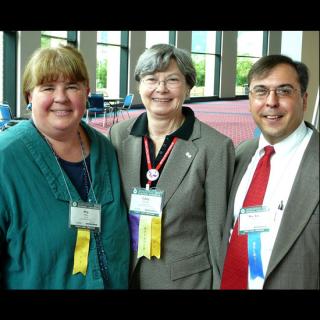Re-envisioning International Relations

General Assembly 2007 Event 3011
Presenters: Meg Riley, UUA Director of Advocacy and Witness, Cathy Cordes, UUA Director of International Resources (until August 2007), Rev. Eric Cherry, UUA Director of International Resources (effective August 2007)
The Unitarian Universalist Association (UUA) is building a new structure to drive the work of international relations to individual congregations with the UUA taking a supporting role. Attendees at the General Assembly (GA) workshop on the topic gave a mixed reception to the plan, expressing frustration about the number of overlapping groups in the area.
“This past year has been a transitional year for the international office,” said Meg Riley, the UUA director of advocacy and witness who led the GA workshop
The UUA is forming a new advisory council to develop strategies for international work, reporting to President William Sinkford. Former UUA President John Buehrens has agreed to chair the council. About six other members are being recruited to fill out its ranks.
The council will help set up an ambassador’s group that will consist of a number of liaisons with international congregations and other partners outside the US. The advisory council will help define the ambassador’s group which could be formed by GA 2008.
In addition, the UUA has hired a full time director of international resources who will start work in August. Rev. Eric Cherry will replace Cathy Cordes who held the position as a part-time role.
Rev. Cherry will use the Web and other resources to help congregations tell the stories of the international work they are doing and make the right connections with other UU agencies. Despite his international title, Rev. Cherry said he expects his travel will be in domestic visits to U.S. congregations.
“There are many congregations that have gained significant experience in certain aspects of international relations,” he said.
“Historically the UUA was responsible for maintaining international relationships, but it’s too much for any one person,” said Riley. “Now we think the UUA office should support congregations where the real international work happens,” she added.
Sorting through the variety of groups chartered to oversee international UU relations can be confusing, some workshop attendees said. In addition to the UUA office, other agencies include the International Council of Unitarians and Unversalists, the UU Partner Church Council and the UU United Nations Office.
“We need to consider stepping back to look at how we overlap and find ways to collaborate or even merge,” Marilyn Mehr, board president of UNO in a question and answer period. “Congregations are confused because they are asked to give to all these groups,” she said.
“If we have a way for people to connect with the right resources, it won’t matter if they understand the alphabet soup of different organizations. That’s what Eric will do,” said Cordes, executive director of UUPCC who helped lead the workshop.
Separately a representative from Women’s Rights Worldwide said the group is drafting a report to the UUA that recommends it convene an annual meeting of all the international groups to help coordinate efforts.
Rev. Abhi Janamanchi, president of the International Association for Religious Freedom and minister of the UU Congregation of Clearwater, Florida, expressed a mix of excitement and anxiety about the UUA changes “The anxiety is around the limits of the vision the board has created,” he said.
He called for greater pluralism in UU international work, reaching out to a broader set of cultures and religions around the globe.
Another speaker at the workshop said the UUA needs to pick one or two international programs where the group can have impact.
Riley noted the group’s education efforts in India that have been going on more than 20 years. The UUA recently added staff members to its Washington DC office, focusing on legislation and international outreach in cases of war and crisis.
A survey conducted last year of international efforts among UU congregations got more than 600 responses. It found education programs run by religious education groups were widespread. About 27 percent of congregations run international community or economic programs and 20 percent have immigrant programs such as English education.
“I challenge you to go back to tell your congregations what kinds of involvements you have and work with Eric about communicating about them more broadly,” said Cordes.
Reported by Rick Merritt; edited by Pat Emery.